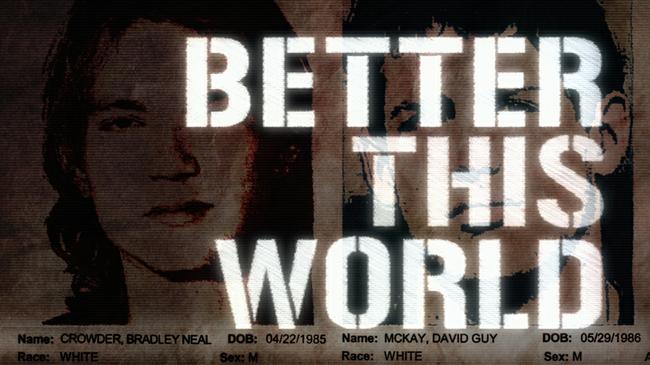The idea of bettering the world often leads America’s youth to put an action behind their revolutionary passions. Whether its a small protest in Columbia or a march in New York City, there is now no national threat distinction between the two in the eyes of Congress and post 9/11 laws.
“Better This World” directors Katie Galloway and Kelly Duane de la Vega document the terrorism case of Texans Bradley Crowder, 23, and David McKay, 22, following their arrests while protesting at the 2008 Republican Convention in Minneapolis.
“It’s not a black and white case,” Galloway says. “It’s a very meaty case in terms of themes for-post 9/11 America and mainly, we were interested in people thinking deeply about what goes on behind the headlines.”
True/False Film Festival is bringing the film to Ragtag Cinema in partnership with the Reynolds Journalism Institute on Nov. 16. After the film, a panel will be held where viewers can question Galloway, journalist Petra Bartosiewicz and MU law professor Christina Wells about issues presented in the film.
“Better This World” is an example of the types of innovative films True/False chooses to back. Galloway, a fan of the True/False Film Fest, first came to them with the film knowing she’d be placing it in good hands.
“One of the hallmarks of True/False is that we don’t tend to program based on topic,” True/False Director David Wilson says. “When we show a film we want to provoke debate and I think this film will definitely do that.”
The New York Times published an article in Jan. 2009 covering McKay and Crowder’s trial that caught Galloway’s attention. She felt it was a great opportunity to take a look at one of the many domestic terrorism cases and show how the investigation and persecution unfolds by going to trial. The film aims to portray what led to their crime while documenting what happened between these two men and their mentor, Brandon Darby, who is a former leftist radical-turned FBI informant, in the months prior to their arrest and conviction.
“What these men were going through, their political passions and choices, is something that resonates with college audiences,” Galloway says.
Bartosiewicz wrote an article titled “To Catch a Terrorist” in Harper’s Magazine, where she highlights the preemptive model the FBI uses to try and catch potential terrorists before they act through the use of informants. “Better This World” exemplifies how this system backfires and instead of discovering true criminal behavior, this tactic seems to be extending beyond attacks plotted overseas and the government entrapping citizens on our home soil.
“Katie’s case shows a very chilling example of how the new post 9/11 laws are being applied,” Bartosiewicz says. “I’m here to bring a broader perspective on the intelligence investigative apparatus that has been built in the U.S. to combat terrorism since 9/11 and how its gone from targeting terrorist to expanding to activists.”
The film’s title stems from a line in the movie and the conflicting motives of the defendants, their families and prosecutors, who all hope to better this world in the name of protection and injustice. But who is just, and is the FBI acting as a provocateur rather than a protector? This cautionary tale hopes to evoke this internal dialogue that’ll have viewers wondering where the fine line between right and wrong falls and, if the feds come knocking, one of them will find themselves teetering on its morally-questionable string.








